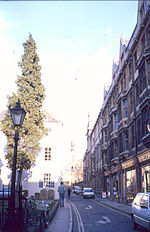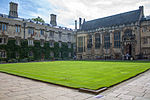Trinity College, Oxford

Trinity College (full name: The College of the Holy and Undivided Trinity in the University of Oxford, of the foundation of Sir Thomas Pope (Knight)) is one of the constituent colleges of the University of Oxford in England. The college was founded in 1555 by Sir Thomas Pope, on land previously occupied by Durham College, home to Benedictine monks from Durham Cathedral.Despite its large physical size, the college is relatively small in terms of student numbers at approximately 400. It was founded as a men's college and has been coeducational since 1979. As of 2022, the total funds of Trinity amounted to £212 million, including a financial endowment of £181 million.Trinity has produced three British prime ministers, placing it third after Christ Church and Balliol in terms of former students who have held that office.
Excerpt from the Wikipedia article Trinity College, Oxford (License: CC BY-SA 3.0, Authors, Images).Trinity College, Oxford
Magdalen Street East, Oxford City Centre
Geographical coordinates (GPS) Address External links Nearby Places Show on map
Geographical coordinates (GPS)
| Latitude | Longitude |
|---|---|
| N 51.755343 ° | E -1.256958 ° |
Address
Trinity College
Magdalen Street East
OX1 3AG Oxford, City Centre
England, United Kingdom
Open on Google Maps








